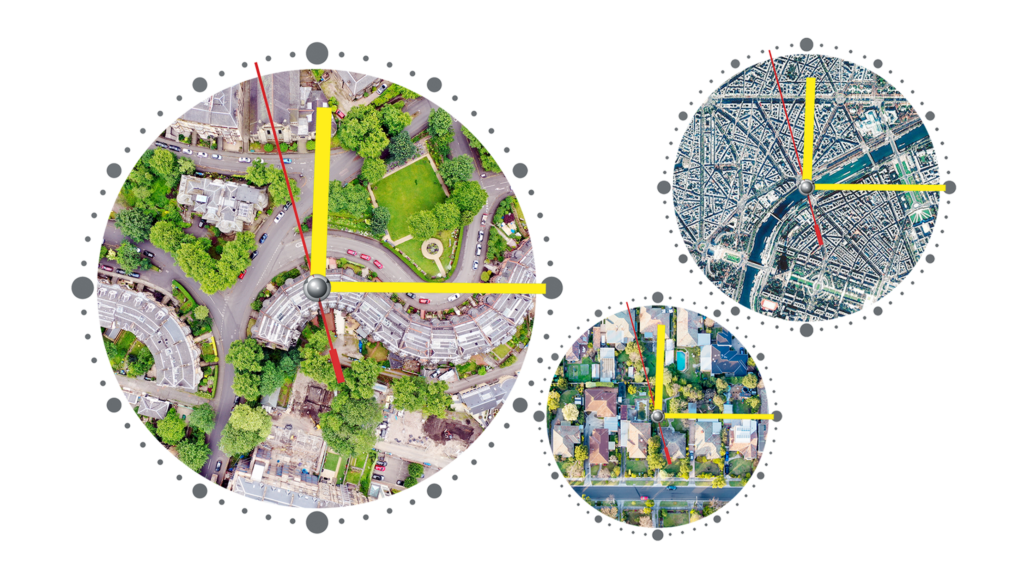Does your neighbourhood allow you to meet your key needs within 10 minutes?
The 5, 10, and 15-minute city is all about living locally. Giving people the ability to meet most of their everyday needs within a 5, 10, or 15-minute walk, scooter, cycle, or public transport trip of their home. This concept was first implemented in Paris to reduce transport emissions and increase vibrancy, wellbeing, and safety within communities.
This concept has gained lots of attention in recent news and research, however, few have evaluated the concept for our own cities to see just how well they perform. Therefore, we have evaluated all of New Zealand’s “medium” to “major urban areas” to understand how residents currently access education, healthcare, greenspace/recreation, food, and other essential services. Understanding how our communities currently stack up allows us to better evaluate future decisions and monitor progress. Explore our results below.

For residents: Use our interactive app below to explore the community that you, your parents, or your friends live in (or may live within in the future). Does it meet your needs for healthy food, education, recreation, health care, and more?
For local and central authorities: Councils within Aotearoa New Zealand (and abroad) are striving for inclusive, healthy, safe, resilient, and low-emission futures. Given this, they should be considering the current opportunities available to their residents by exploring measures like the 15-minute city (or a 10-minute city if they really want to see their communities thrive). With this, they can ensure future development and investment decisions build the well-being and capacity of current communities before they break ground on new ones.
Please note: (1) walking and cycling durations do not account for elevation, we are working hard to add this feature as soon as possible. (2) Public transport functionality can also be expected in due course. (3) We’re in the early stages of validating our location data, if you spot something missing, let us know!
Read More:
- Talk Wellington discusses the 15 Minute City in our capital
- ‘Shovel-ready’ projects ignore important aspects of community resilience
References
Logan, T. M., Anderson, M. J., Williams, T. G., & Conrow, L. (2021). Measuring inequalities in urban systems: An approach for evaluating the distribution of amenities and burdens. Computers, Environment and Urban Systems, 86, 101590. https://doi.org/10.1016/j.compenvurbsys.2020.101590
Logan, T. M., & Guikema, S. D. (2020). Reframing Resilience: Equitable Access to Essential Services. Risk Analysis: An Official Publication of the Society for Risk Analysis, 1, 72. https://doi.org/10.1111/risa.13492
Deng, B.Y., Wiki J., Hobbs, M., Marek, L., Campbell, M., & Kingham, S. (2020). GeoHealth laboratory dataset: cleaned nationwide alcohol outlets 2015–2018. (Version 1) [Data set]. Available from: https://www.canterbury.ac.nz/science/research/geohealth/publications-reports-and-data/
Wiki J., Hobbs, M., Marek, L., Campbell, M., & Kingham, S. (2020). GeoHealth laboratory dataset: cleaned nationwide pharmacies. (Version 1) [Data set]. Available from: https://www.canterbury.ac.nz/science/research/geohealth/publications-reports-and-data/
Marek, L., Wiki J., Hobbs, M., Campbell, M., & Kingham, S. (2020). GeoHealth laboratory dataset: cleaned nationwide hospital locations. (Version 1) [Data set]. Available from: https://www.canterbury.ac.nz/science/research/geohealth/publications-reports-and-data/
Hobbs, M., Wiki, J., Marek, L., Campbell, M., & Kingham, S. (2020). GeoHealth laboratory dataset: cleaned nationwide general practitioner locations. (Version 1) [Data set]. Available from: https://www.canterbury.ac.nz/science/research/geohealth/publications-reports-and-data/
Hobbs, M., Wiki, J., Marek, L., Campbell, M., & Kingham, S. (2020). GeoHealth laboratory dataset: cleaned nationwide community oral health service locations. (Version 1) [Data set]. Available from: https://www.canterbury.ac.nz/science/research/geohealth/publications-reports-and-data/
Wiki, J., Kingham, S., & Campbell, M. (2019). Accessibility to food retailers and socioeconomic deprivation in urban New Zealand. New Zealand Geographer, 75(1), 3-11. doi:10.1111/nzg.12201
